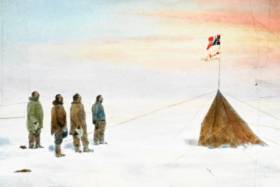Displaying items by tag: Biodiscovery
Galway Hosts Amundsen Exhibition Ahead Of SeaFest
#Amundsen - A unique exhibition on Roald Amundsen’s expedition to the South Pole was officially opened at NUI Galway by Seán Kyne TD, Minister of State for Gaeltacht Affairs and Natural Resources, on World Oceans Day (Thursday 8 June).
A collaboration between NUI Galway and the Marine Institute, in association with the Norwegian Embassy and the Fram Museum in Oslo, Cold Recall – Roald Amundsen’s Reflections from the South Pole will be on display in the O’Donoghue Centre for Drama, Theatre and Performance at NUI Galway till Saturday 8 July.
Amundsen was the first in the world to navigate the Northwest Passage and the first to reach the South Pole on 14 December 1911.
Norwegian Polar history is closely connected to defining Norway as an independent state in 1905, and to Norway's position as a state closely connected to the oceans and to polar regions.
Her Excellency Else Berit Eikeland, Ambassador of the Royal Norwegian Embassy to Ireland, expressed her delight that the exhibition will be on display in Galway.
“Amundsen’s party had immense courage and determination to make the dangerous trek across the ice and snow to reach the South Pole,” she said. “This exhibition offers a pictorial account of the expedition and of Amundsen, one of the greatest figures in the field of polar exploration and a national hero for a very young nation.”
Speaking ahead of the opening last Thursday, NUI Galway president Dr Jim Browne, said: “Polar exploration remains a rich source for academic researchers and here in NUI Galway our academics are engaged with polar research in a range of ways and in such diverse field as particle physics, climate change, marine biology and biodiscovery, and even the literary history of polar travel.”
Marine Institute chief executive Dr Peter Heffernan added: “The exploration and voyages across our oceans and particularly Amundsen's extraordinary journey to the South Pole are important to our maritime history. Through this exhibition, visitors can remember and celebrate one of the most remarkable feats of exploration.”
The exhibition runs in association with SeaFest 2017, Ireland’s national maritime festival, taking place in Galway from 30 June to 2 July .
Last month Marine Minister Michael Creed officially opened Ireland’s first sea science gallery at Galway City Museum to mark the launch of the festival, as previously reported on Afloat.ie.
#MarineScience - Marine scientist and researcher Dr Louise Allcock from NUI Galway is leading a team of 10 university researchers and students on a two-week deep-sea expedition researching cold water corals and sponges.
The team — who can be followed on the Scientists@Sea blog – are currently exploring the Whittard Canyon, located 200 nautical miles south-west of Ireland at the edge of the continental shelf in the Atlantic Ocean aboard the Marine Institute’s RV Celtic Explorer, which recently returned from a climate change ‘health check’ of the Atlantic.
And the researchers are making extensive use of the Marine Institute’s ROV Holland I, deployed into areas where the sea floor rapidly drops from around 300m down to 3,000m.
“The researchers and students are seeing for the first time corals and sponges covering an area around the Whittard Canyon, Porcupine Seabight, Gollum Channel and the Belgica Mounds in Irish waters,” said Dr Olivier Thomas, a professor of marine biodiscovery at NUI Galway and co-ordinator of the National Marine Biodiscovery Laboratory located at the Marine Institute.
Dr Allcock added: “Using the ROV’s robotic and lighting capabilities, we are able to manoeuvre the Holland I, which is comparable to the size of a mini-van, through the water, and use its arms and clasps, which are like hands, to take small samples of corals, sponges and other specimens from extremely hostile parts of the ocean floor where there is no natural light and tremendous ocean pressure.”
By analysing past research relating to sponges and corals, Dr Allcock explained that her team “are able to see that some species are better target groups than others in having antimicrobial or anti-cancer properties.
“Based on this information we are building mathematical models to predict the likelihood of any given species yielding a novel natural product, along with developing species distribution maps of corals and sponges on the deep-sea floor, so that we know the best places to go searching.”
When the research team returns from sea, they work with the national marine biodiscovery lab at the Marine Institute. The chemists at NUI Galway extract the chemical compounds from all of the samples of sponges and corals to see if they have drug-like characteristics such as anti-cancer or antimicrobial properties that can be used for novel drugs to combat human illnesses.
“Chemists involved in biodiscovery research only need small quantities of any organism to develop a new drug, because once a suitable compound is identified, it can be synthesised in the lab, which can then be used in drugs to combat human diseases,” said Dr Thomas.
The ROV Holland I provides high definition continuous video footage of the deep seafloor as it is being used to collect samples.
“Going back through footage after the expedition enables us to further analyse the location recording of all the corals and sponges,” said Dr Allcock. “This improves future predictions of where else we might find similar specimens and also allows us to provide data to inform conservation policy so that we make sure that important ‘hotspots’ rich in corals and sponges are preserved.”
Marine Institute chief executive Dr Peter Heffernan was enthusiastic about the mission’s prospects.
“These are exciting times to be a marine researcher as marine scientists around the world have discovered more species in the ocean in the last ten years than ever before, with an average of 2,000 new discoveries each year,” he said.
“In Ireland we are contributing to building on this wealth of valuable information and sharing the best available science and knowledge to inform decisions affecting the Atlantic Ocean.”
This survey is being undertaken as part of a five-year project on ‘Exploiting and conserving deep-sea genetic resources’ at NUI Galway, co-funded by the Science Foundation Ireland and Marine Institute.
The National Marine Biodiscovery Laboratory project brings together six of the country’s leading marine researchers across a range of disciplines from NUI Galway, University of Limerick and University College Cork to study how marine substances might in future be used to make ingredients for cosmetics, pharmaceuticals and functional foods.






























































